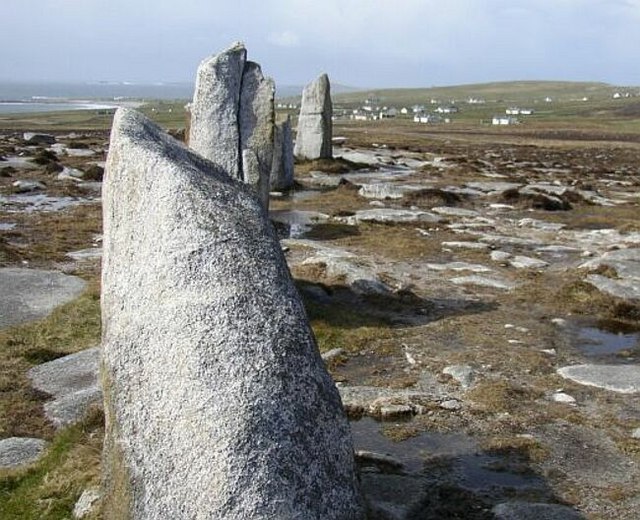【The Pursuit of Lust 4 (2024)】
On the Far Side of Belmullet
The Review’s Review

Roger, “Fallmore Granite Stone Circle.” Licensed under CC BY-SA 2.0.
En route to a crime scene down back roads in rural Ireland, Sergeant Jackie Noonan briefly flips down her car’s sun visor to check out the sky. “That is some incarnation of sun,” Noonan announces to her fellow officer Pronsius, and though it falls over a landscape where cows “sit down like shelves of rock in the middle of the fields,” she deems it “equatorial.”
“You know where Guadalajara is, Pronsius?”
“Is it the far side of Belmullet?”
Technically, she concedes, it is. A little later when she asks him, “You ever been anywhere exotic, Pronsius?” he replies, “I been the far side of Belmullet.”
The answer satisfies Noonan, who’d prefer to never cross another time zone or pass through another metal detector again—who considers but never splurges on the expensive coffee in the grocery. She will never be exactly content where she is, but would rather find ways to picture the exotic in the local, to imagine rather than reenter the unknown.
“The far side of Belmullet” is an ideological state that permeates Colin Barrett’s new short story collection, Homesickness, which opens with Noonan’s character, in the story “A Shooting in Rathreedane.” Like the short stories in Barrett’s fine 2014 debut, Young Skins, which were all set in a fictional small town in his native Ireland, the eight that make up Homesickness(all but one of which are also set in rural Ireland) foreground language. That is, the action of the stories proceeds directly from the tensions between the interior and exterior states of its characters, who share variations on the affliction of the collection’s title. This geographical malaise is expressed in lyricism and in dry dialogue, perfectly delivered in a range of hyperlocal articulations of the black humor of marginalized people all over the world. In their natural swings from the darkly comic to the gothic elegiac, Barrett’s stories share some commonality with Tom Drury’s; in their intuitive omissions, Mary Robison’s. At times the characters pointedly admonish each other to condense their speech.
“It so happens I think telling people about your dreams is fine,” Emma tells her friend Ciara in “The Silver Coast,” who is unsurprisingly inept at conveying the details of her ayahuasca ritual in South America to an Irish kitchen table in January, “so long as the account is brief.”
A number of the characters in Homesicknessare writers in one way or another, actively defining themselves within the confines of their world, using language to push at its borders. This is also true even of characters least likely to escape their surroundings. When Noonan and Pronsius encounter the son of the alleged shooter on Rathreedane Road, he identifies himself both floridly and defensively: “I’ve no say in it but every cunt that knows me does call me Bubbles.”
Elsewhere, visions of the far side of Belmullet beckon, mirage-like. In “The Ways,” Gerry, reluctantly playing the part of a Yankee ex-mercenary, settles for escaping into the fantasy sunsets of a PlayStation American frontier rendered in Blood Dusk 2. In “The 10,” Danny, a standout soccer player who comes home after failing to secure a league contract, wakes to a screensaver of a “palely glowing green moss … like the surface of an alien planet.” It turns out to be only a lava field in Iceland. Later, when he takes a few drags off a joint while standing in a wind turbine farm, his racing mind sees the field as a mirror of his own dejected state: “The grass shimmered in huge silver chevrons where the coastal winds had rhythmically beaten it down.”
Barrett’s characters must, like short story writers, work within the limitations of form and of place. When Sergeant Noonan drives past a pack of teenage boys in town, she has a seemingly small but perfectly realized observation: “The thing about boys was that they only had the one haircut. That haircut changed every year, but the thing was, they all had it.”
—Rebecca Bengal
You can read Rebecca Bengal’s essay on Ellsworth Kelly on theDaily here, and a 2015 interview with Colin Barrett here.
Search
Categories
Latest Posts
The Rise of the Mindful Museum
2025-06-25 21:32Cooking with Patrick O’Brian by Valerie Stivers
2025-06-25 20:47Jo Hopper, Woman in the Sun
2025-06-25 20:24Is It Ever Okay to Depict Muhammad? by Michael Muhammad Knight
2025-06-25 20:17So Much Winning
2025-06-25 19:36Popular Posts
Parkland: Urgency and Insurgency
2025-06-25 22:18Poetry Rx: Valentine’s Day Edition by Kaveh Akbar
2025-06-25 22:14James Baldwin, Restored by Hilton Als
2025-06-25 22:00Revisited: Watership Down
2025-06-25 21:08The Post-Text Hustle
2025-06-25 21:02Featured Posts
Different by Design
2025-06-25 21:51To Be At Home Everywhere by Drew Bratcher
2025-06-25 21:15Poetry Rx: And You Want to Be Liked by Kaveh Akbar
2025-06-25 20:12Mars may have harbored a shocking amount of water, scientists find
2025-06-25 20:12Juggalos, Nevertheless Persisting
2025-06-25 20:11Popular Articles
The “Free Speech” Cheat
2025-06-25 21:48Redux: Nouns Like Desire by The Paris Review
2025-06-25 21:27The Bloody Family History of the Guillotine
2025-06-25 20:24Pandora in Blue Jeans by Briallen Hopper
2025-06-25 19:53Cops on Campus
2025-06-25 19:43Newsletter
Subscribe to our newsletter for the latest updates.
Comments (8295)
Faith Information Network
No Country of Civil Men
2025-06-25 22:19Wisdom Information Network
Staff Picks: Death, Dávila, and Darkness by The Paris Review
2025-06-25 21:40Wave Information Network
Monsieur Bébé: The Brief, Strange Life of Raymond Radiguet
2025-06-25 20:24Evergreen Information Network
Paris, Reviewed
2025-06-25 20:17Free Roaming Information Network
Between a Strike and a Hard Place
2025-06-25 20:12